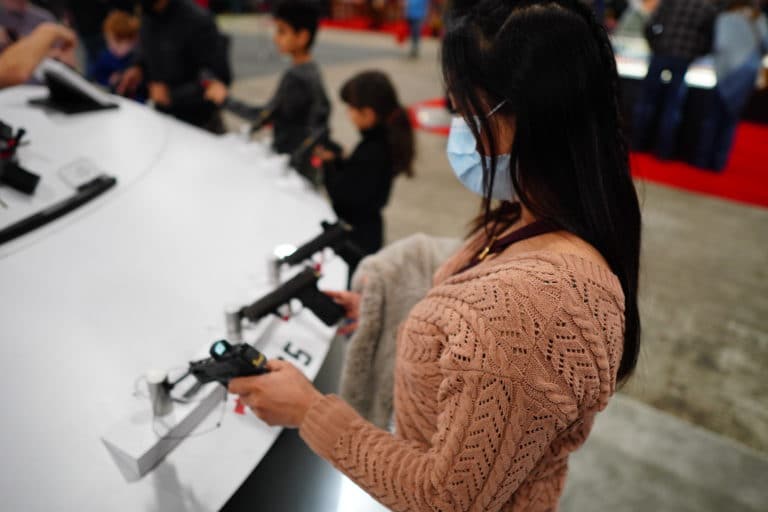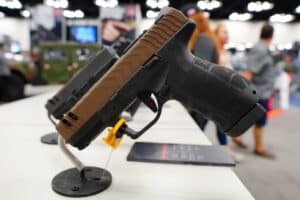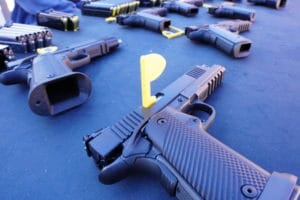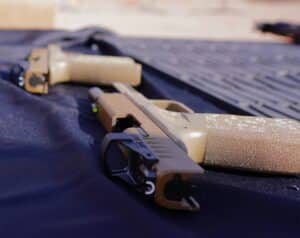Already faced with a restricted supply due to state law, California residents will see their options for legal handguns diminish yet again.
The California Department of Justice announced on Friday that all pistols in the USP line from popular gunmaker Heckler & Koch (H&K) were removed from the state’s approved handgun roster. As a result, the pistols “may no longer be sold, offered for sale, or manufactured” in the state.
“On May 6, 2022, the Heckler & Koch USP9 V1, USP40 V1, Compact USP45 V1, Compact USP40 V1, USP 40 Expert V9, USP 45 Expert V1, USP40C-LEM, USP Compact 9 Stainless V1, USP Compact 45 Stainless V1, USP Compact 40 Stainless V1, and USP 45 Elite handguns were removed from the Roster of Certified Handguns pursuant to California Code of Regulations, title 11, section 4070(c),” a California DOJ bulletin disseminated to licensed gun dealers in the state reads. “Any further questions should be directed to Heckler & Koch.”
It is not immediately clear why the pistols were suddenly “de-certified.” The state can remove a handgun from the approved roster under current California law if a gunmaker fails to pay the annual maintenance fee required by statute to the state, if the approved handgun model is modified in any way after it has been certified, or if it deems the handgun “unsafe” upon further review.
Neither the California DOJ nor Heckler & Koch responded to a request for comment on the decision to remove the line of pistols.
The de-certification of popular and previously approved handguns highlights the effects of one of the more peculiar laws on the books in a state known for restrictive gun policy. Gun owners reacted to news of the de-certification through online forums. Comments reviewed by The Reload show many owners were shocked and confused, while others denounced the state’s gun politics more broadly.
“Oh man, this whole roster thing blows,” user FNGGLock wrote on the CalGuns forum. “Glad I got mine end of year last year, but people should be able to get USPs.”
California is one of three states plus the District of Columbia with what is known as a “handgun roster.” Under the 2001 Unsafe Handgun Act, only handguns deemed “safe” are eligible to be placed on California’s roster of certified firearms approved for civilian sale. Handguns deemed “unsafe” are generally unavailable for commercial sale in the state, though the “unsafe” pistols are still available for law enforcement.
To be deemed safe for sale by the state, handguns must possess certain features. For example, semiautomatic pistols must have a manual safety, a loaded chamber indicator, a magazine disconnect mechanism, and microstamping technology. The microstamping requirement has been challenged in state and federal courts. No new handguns have been added to the roster since its implementation in 2013.
The law is highly controversial among gun owners. Carveouts that allow “unsafe” handguns to be purchased and used by law enforcement officers have led to several high-profile scandals involving black market sales to civilians in recent years.
Likewise, the state regularly updates the criteria for making it on the approved roster. This has resulted in a diminishing selection of legal handguns over time. Exacerbating this issue is the recently passed Assembly Bill 2847. Set to go into effect in July of 2022, it will automatically remove three previously approved handguns from the roster for every new model the state approves. This provision has already drawn a legal challenge from gun-rights supporters.
The H&K USP line of handguns, short for “universal self-loading pistol,” has been produced since 1993. Available in most common calibers, they remain a popular choice among collectors and shooting hobbyists across the country.







2 Responses
It’s worth noting when New York applied similar restrictions to civilians with regards to ammo in 2018, ammo manufacturer Hornady ceased all sales to New York government agencies.
I believe we need similar principled action from the firearms industry when it comes to laws like this one.
Glock, in particular, has a “Blue Label” program and is heavily ingratiated with law enforcement. As pointed out in the article, it is a very common occurrence for private or semi-retired members to engage in private resale, for profit, of two- to five-times the value of an “off roster” modern Generation 5 handgun.
Finally, I believe there is a consensus that the California DOJ is trying to eliminate as many models as possible by claiming even the most minor change (for safety, or simply ease of production) invalidates a listing, but comparing new models to twenty year old archive ones.
One knowledgeable expert cited Franklin Armory switching to a “plastic PMAG” from a “metal GI mag” causing a complete denial and recertification. Another cited a “manual milling” (one at a time on a vice) operation being changed to a “tombstone milling” operation (multiple at once on a CNC machine). Or with the HK: a strengthened firing pin circa 2005.
As an individual: I would like to see denial of sales to California government or law enforcement, voiding of warranties, cessation of aftermarket part sales through distributors, and confiscation of firearms returned to armorers for repair. However some companies are again ingratiated to LEO through “donations” of firearms to officers. (One brand comes to mind in particular, but source remains confidential and anecdotal.)
It certainly seems like an effort by California to effectively ban handguns over the longterm. These are definitely some interesting potential tactics for forcing change. I wonder when the tipping point for the industry will come on this.